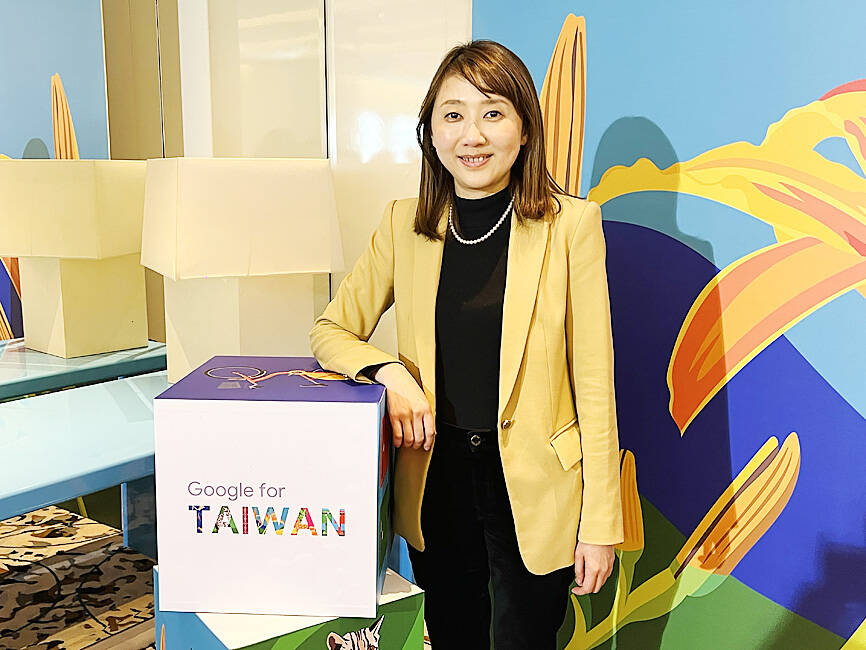Google is still evaluating market demand and adjusting its plan to build a new data center in Tainan, Google Taiwan managing director of sales and operations Tina Lin (林雅芳) told the Central News Agency on Sunday.
Lin was speaking after the company was questioned last year by city councilors as to why it had not begun construction of the facility after it announced plans to construct the center more than four years ago.
Lin did not give any more details on the Tainan plan, but emphasized that Google was continuing to invest in its data center in Changhua County, its first in Taiwan.

Photo: Hsu Tzu-ling, Taipei Times
She also said that the level of data handled by the center and its service scope has increased fivefold compared with when it opened in 2013, making it Google’s largest data center in Asia.
Google opened its first Japanese center in Inzai City, Chiba Prefecture, in March last year.
Lin said that in addition to building data centers, Google is continuing to ramp up its investment in Taiwan in other ways.
Its second office building in New Taipei City’s Banciao District (板橋) is expected to open in the second quarter of this year, following the unveiling of its new office complex in the Taipei Far Eastern Telecom Park (Tpark, 台北遠東通訊園區) in 2021.
The capacity of the second building is more than twice that of the company’s first office and would bring together talent from Google’s other locations, Lin said.
She added that Google’s engineering laboratories in Taiwan are in short supply and that the new office building would house different types of labs to help boost research and development.
Some employees in the hardware department are still working in a range of locations across Taipei, New Taipei City, Taoyuan and Hsinchu, but the new office means they would all share the same hub, which would help improve coordination and efficiency, Lin said.
The 16-floor office complex in Tpark is Google’s first and largest hardware development base outside the US and features a gym, massage room, rest area and health center for employees.

Real estate agent and property developer JSL Construction & Development Co (愛山林) led the average compensation rankings among companies listed on the Taiwan Stock Exchange (TWSE) last year, while contract chipmaker Taiwan Semiconductor Manufacturing Co (TSMC, 台積電) finished 14th. JSL Construction paid its employees total average compensation of NT$4.78 million (US$159,701), down 13.5 percent from a year earlier, but still ahead of the most profitable listed tech giants, including TSMC, TWSE data showed. Last year, the average compensation (which includes salary, overtime, bonuses and allowances) paid by TSMC rose 21.6 percent to reach about NT$3.33 million, lifting its ranking by 10 notches

Popular vape brands such as Geek Bar might get more expensive in the US — if you can find them at all. Shipments of vapes from China to the US ground to a near halt last month from a year ago, official data showed, hit by US President Donald Trump’s tariffs and a crackdown on unauthorized e-cigarettes in the world’s biggest market for smoking alternatives. That includes Geek Bar, a brand of flavored vapes that is not authorized to sell in the US, but which had been widely available due to porous import controls. One retailer, who asked not to be named, because

SEASONAL WEAKNESS: The combined revenue of the top 10 foundries fell 5.4%, but rush orders and China’s subsidies partially offset slowing demand Taiwan Semiconductor Manufacturing Co (TSMC, 台積電) further solidified its dominance in the global wafer foundry business in the first quarter of this year, remaining far ahead of its closest rival, Samsung Electronics Co, TrendForce Corp (集邦科技) said yesterday. TSMC posted US$25.52 billion in sales in the January-to-March period, down 5 percent from the previous quarter, but its market share rose from 67.1 percent the previous quarter to 67.6 percent, TrendForce said in a report. While smartphone-related wafer shipments declined in the first quarter due to seasonal factors, solid demand for artificial intelligence (AI) and high-performance computing (HPC) devices and urgent TV-related orders

MINERAL DIPLOMACY: The Chinese commerce ministry said it approved applications for the export of rare earths in a move that could help ease US-China trade tensions Chinese Vice Premier He Lifeng (何立峰) is today to meet a US delegation for talks in the UK, Beijing announced on Saturday amid a fragile truce in the trade dispute between the two powers. He is to visit the UK from yesterday to Friday at the invitation of the British government, the Chinese Ministry of Foreign Affairs said in a statement. He and US representatives are to cochair the first meeting of the US-China economic and trade consultation mechanism, it said. US President Donald Trump on Friday announced that a new round of trade talks with China would start in London beginning today,